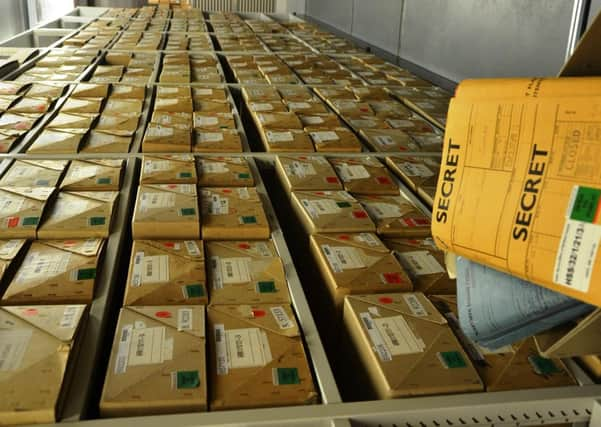Mark Devenport: The disputes over history in Northern Ireland will go on and on


It is named after an inspired design, dating back more than a century, for a leading brand of Dutch cocoa powder.
The cocoa tin featured a nurse holding a cup of hot chocolate and a Droste cocoa tin, on which the same nurse carrying the same cup is clearly emblazoned. The effect appears to go on ad infinitum.
Advertisement
Hide AdAdvertisement
Hide AdLast month, sifting through previously classified files released by the Public Records Office (PRONI), I felt as if I was staring at the nurse on the cocoa tin, engaging in a never ending reflection back into history.


Examining a file from the 1990s dealing with the 150th anniversary of the Potato Famine, I came across a discussion involving British diplomats about how they might combat a campaign by Irish American lobbyists to add the famine to the US school curriculum.
What exercised the diplomats wasn’t that American pupils would learn about the appalling loss of an estimated one million lives during the ‘Great Hunger’ of the 1840s. Instead it was the fact that Irish American campaigners wanted it taught as an example of genocide, comparable to the Nazi holocaust.
The papers reveal diplomats discussing whether the UK should sponsor historians to develop teaching materials sympathetic to the British.
Advertisement
Hide AdAdvertisement
Hide AdSuch texts might argue that the famine amounted to the terrible consequence of indifference and neglect by London, rather than deliberate genocide.
It’s not clear whether any text was commissioned. Elsewhere, the diplomats conclude that even if US politicians passed laws to put the Irish famine on their curriculum, most American high schools didn’t have the resources to devote any time to the topic.
The PRONI files deal not just with how any famine commemoration should be handled, but also whether its history might be framed to assuage contemporary sensitivities.
Sounds familiar? Fast forward a quarter of a century and we are now all characters in another ‘Droste’ style tableau in which we shall be invited to peer back into the history of the partition of Ireland to draw whichever conclusions we deem fit.
Advertisement
Hide AdAdvertisement
Hide AdThe NIO has appointed a Historical Advisory Panel which, in the words of its chair, Professor Lord Paul Bew, will “develop key themes and collectively enrich public understanding of the events of 1920-22, and their implications”. A separate panel is planning events to commemorate or celebrate the birth of the modern UK.
Whatever these panels determine, it is inevitable unionists and nationalists will draw sharply different conclusions. The former might celebrate their ‘great escape’ from an Irish theocracy to create ‘our wee country’.
The latter are boycotting the NIO-led commemorations and decrying the tragedy of partition and the carving out of a “Nameless Satrapate made up of the six amputated counties” in the north east of the island.
For that last splendid quote, from the Bishop of Down and Connor Joseph MacRory writing in 1920, I am indebted to the historian Alan Parkinson.
Advertisement
Hide AdAdvertisement
Hide AdDr Parkinson’s engrossing study of the early years of Northern Ireland ‘A Difficult Birth’ transports the reader back into the frightening years of 1920-22 when sectarian and paramilitary violence, collusion and ethnic cleansing matched the worst points of our more recent ‘Troubles’.
There is enough brutality here – the cold blooded murders of the Catholic McMahon family, apparently by ‘rogue’ police officers, in North Belfast or the IRA’s massacre of vulnerable Protestant farmers in the County Armagh hamlet of Altnaveigh — for partisans to bolster their own predetermined views. But perhaps others will endeavour to learn something from the carnage in order to avoid the repetition of past mistakes.
At the start of this decade of contentious centenaries, the Community Relations Council and the Heritage Lottery Fund developed a series of principles designed to steer our way through these choppy waters.
They included starting “from the historical facts”, recognising “the implications and consequences of what happened”, and understanding “that different perceptions and interpretations exist”.
Advertisement
Hide AdAdvertisement
Hide AdIt would be naïve to think all sides here will ever agree on a single narrative. But 2021 is the centenary not just of Northern Ireland’s difficult birth, but also a landmark essay in which the Guardian editor C.P.Scott railed against propaganda and declared that “comment is free, but facts are sacred”.
In this post-Trumpian world, many propagandists feel free to invent their own facts. Like the ‘Droste effect’ the arguments over partition will go on and on.
Some will celebrate, others will condemn. But it is important we have trusted guides, like Alan Parkinson or that other brilliant exponent of public history Eamon Phoenix, to provide a baseline of truth to help us understand the past and maybe navigate our way towards a better future.
——— ———
A message from the Editor:
Thank you for reading this story on our website. While I have your attention, I also have an important request to make of you.
Advertisement
Hide AdAdvertisement
Hide AdWith the coronavirus lockdown having a major impact on many of our advertisers — and consequently the revenue we receive — we are more reliant than ever on you taking out a digital subscription.
Subscribe to newsletter.co.uk and enjoy unlimited access to the best Northern Ireland and UK news and information online and on our app. With a digital subscription, you can read more than 5 articles, see fewer ads, enjoy faster load times, and get access to exclusive newsletters and content. Visit https://www.newsletter.co.uk/subscriptions now to sign up.
Our journalism costs money and we rely on advertising, print and digital revenues to help to support them. By supporting us, we are able to support you in providing trusted, fact-checked content for this website.
Alistair Bushe
Editor